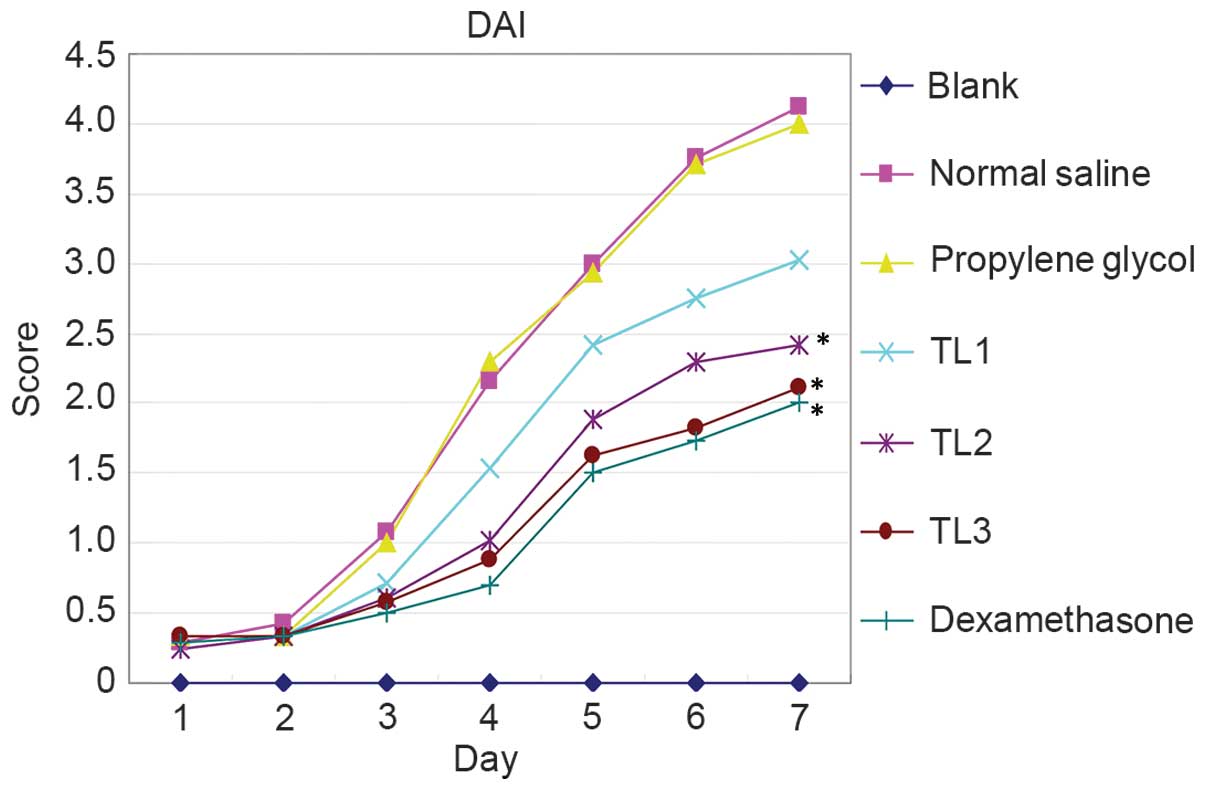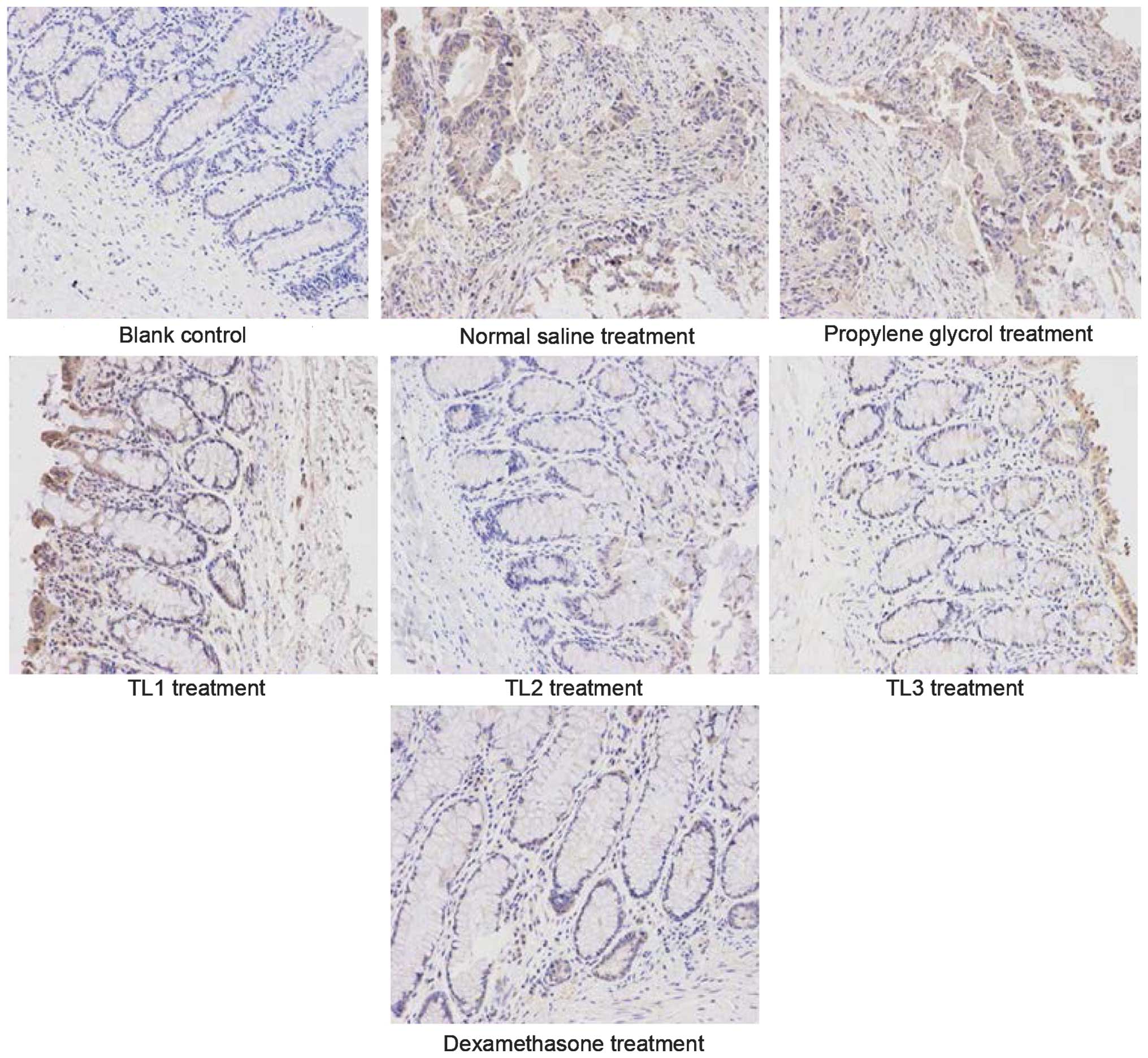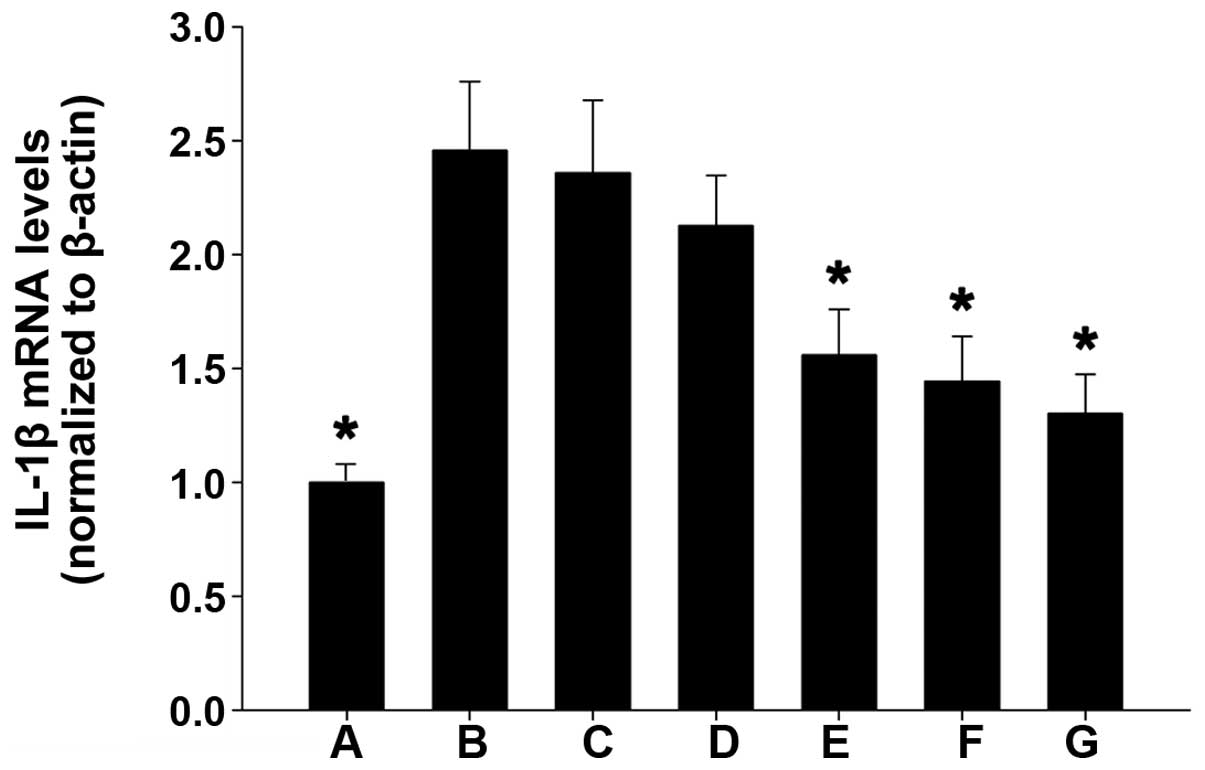|
1
|
Zheng Y, Zhang WJ and Wang XM: Triptolide
with potential medicinal value for diseases of the central nervous
system. CNS Neurosci Ther. 19:76–82. 2013. View Article : Google Scholar : PubMed/NCBI
|
|
2
|
Liu Q: Triptolide and its expanding
multiple pharmacological functions. Int Immunopharmacol.
11:377–383. 2011. View Article : Google Scholar : PubMed/NCBI
|
|
3
|
Kusunoki N, Yamazaki R, Kitasato H, Beppu
M, Aoki H and Kawai S: Triptolide, an active compound identified in
a traditional Chinese herb, induces apoptosis of rheumatoid
synovial fibroblasts. BMC Pharmacol. 4:2–11. 2004. View Article : Google Scholar : PubMed/NCBI
|
|
4
|
Zhou GX, Ding XL, Huang JF, Zhang H, Wu
SB, Cheng JP and Wei Q: Apoptosis of human pancreatic cancer cells
induced by Triptolide. World J Gastroenterol. 14:1504–1509. 2008.
View Article : Google Scholar : PubMed/NCBI
|
|
5
|
Krakauer T, Chen X, Howard OM and Young
HA: Triptolide attenuates endotoxin- and staphylococcal
exotoxin-induced T-cell proliferation and production of cytokines
and chemokines. Immunopharmacol Immunotoxicol. 27:53–66. 2005.
View Article : Google Scholar : PubMed/NCBI
|
|
6
|
Liu Q, Chen T, Chen G, Li N, Wang J, Ma P
and Cao X: Immunosuppressant triptolide inhibits dendritic
cell-mediated chemoattraction of neutrophils and T cells through
inhibiting Stat3 phosphorylation and NF-kappaB activation. Biochem
Biophys Res Commun. 345:1122–1130. 2006. View Article : Google Scholar : PubMed/NCBI
|
|
7
|
Shao H, Ma J, Guo T and Hu R: Triptolide
induces apoptosis of breast cancer cells via a mechanism associated
with the Wnt/β-catenin signaling pathway. Exp Ther Med. 8:505–508.
2014.PubMed/NCBI
|
|
8
|
Wang CY, Bai XY and Wang CH: Traditional
Chinese medicine: A treasured natural resource of anticancer drug
research and development. Am J Chin Med. 42:543–559. 2014.
View Article : Google Scholar : PubMed/NCBI
|
|
9
|
Wang X, Zhang L, Duan W, Liu B, Gong P,
Ding Y and Wu X: Anti-inflammatory effects of triptolide by
inhibiting the NF-κB signalling pathway in LPS-induced acute lung
injury in a murine model. Mol Med Rep. 10:447–452. 2014.PubMed/NCBI
|
|
10
|
Kwon HY, Kim KS, An HK, Moon HI, Kim HJ
and Lee YC: Triptolide induces apoptosis through extrinsic and
intrinsic pathways in human osteosarcoma U2OS cells. Indian J
Biochem Biophys. 50:485–491. 2013.PubMed/NCBI
|
|
11
|
Ding X, Zhang B, Pei Q, Pan J, Huang S,
Yang Y, Zhu Z, Lv Y and Zou X: Triptolide induces apoptotic cell
death of human cholangiocarcinoma cells through inhibition of
myeloid cell leukemia-1. BMC Cancer. 14:2712014. View Article : Google Scholar : PubMed/NCBI
|
|
12
|
Liu Y, Xiao E, Yuan L and Li G: Triptolide
synergistically enhances antitumor activity of oxaliplatin in colon
carcinoma in vitro and in vivo. DNA Cell Biol. 33:418–425. 2014.
View Article : Google Scholar : PubMed/NCBI
|
|
13
|
Wei D and Huang Z: Anti-inflammatory
effects of triptolide in LPS-induced acute lung injury in mice.
Inflammation. 37:1307–1316. 2014.g. View Article : Google Scholar : PubMed/NCBI
|
|
14
|
Mujumdar N, Banerjee S, Chen Z, Sangwan V,
Chugh R, Dudeja V, Yamamoto M, Vickers SM and Saluja AK: Triptolide
activates unfolded protein response leading to chronic ER stress in
pancreatic cancer cells. Am J Physiol Gastrointest Liver Physiol.
306:G1011–G1020. 2014. View Article : Google Scholar : PubMed/NCBI
|
|
15
|
Li J, Liu R, Yang Y, Huang Y, Li X, Liu R
and Shen X: Triptolide-induced in vitro and in vivo
cytotoxicity in human breast cancer stem cells and primary breast
cancer cells. Oncol Rep. 31:2181–2186. 2014.PubMed/NCBI
|
|
16
|
Chen Z, Sangwan V, Banerjee S, Chugh R,
Dudeja V, Vickers SM and Saluja AK: Triptolide sensitizes
pancreatic cancer cells to TRAIL-induced activation of the death
receptor pathway. Cancer Lett. 348:156–166. 2014. View Article : Google Scholar : PubMed/NCBI
|
|
17
|
Zhao R, Zhou H and Su SB: A critical role
for interleukin-1β in the progression of autoimmune diseases. Int
Immunopharmacol. 17:658–669. 2013. View Article : Google Scholar : PubMed/NCBI
|
|
18
|
Li Z, de Zhang K, Yi WQ, Ouyang Q, Chen YQ
and Gan HT: NF-kappaB p65 antisense oligonucleotides may serve as a
novel molecular approach for the treatment of patients with
ulcerative colitis. Arch Med Res. 39:729–734. 2008. View Article : Google Scholar : PubMed/NCBI
|
|
19
|
Dharmani P and Chadee K: Biologic
therapies against inflammatory bowel disease: A dysregulated immune
system and the cross talk with gastrointestinal mucosa hold the
key. Curr Mol Pharmacol. 1:195–212. 2008. View Article : Google Scholar : PubMed/NCBI
|
|
20
|
Leal RF, Coy CS, Ayrizono ML, Fagundes JJ,
Milanski M, Saad MJ, Velloso LA and Góes JR: Differential
expression of pro-inflammatory cytokines and a pro-apoptotic
protein in pelvic ileal pouches for ulcerative colitis and familial
adenomatous polyposis. Tech Coloproctol. 12:33–38. 2008. View Article : Google Scholar : PubMed/NCBI
|
|
21
|
Chang YY and Ouyang Q: Expression and
significance of mucosal beta-defensin-2, TNFalpha and IL-1beta in
ulcerative colitis. Zhonghua Neike Zazhi. 47:11–14. 2008.(In
Chinese). PubMed/NCBI
|
|
22
|
Yamamoto T, Maruyama Y, Umegae S,
Matsumoto K and Saniabadi AR: Mucosal inflammation in the terminal
ileum of ulcerative colitis patients: Endoscopic findings and
cytokine profiles. Dig Liver Dis. 40:253–259. 2008. View Article : Google Scholar : PubMed/NCBI
|
|
23
|
Szkaradkiewicz A, Marciniak R,
Chudzicka-Strugała I, Wasilewska A, Drews M, Majewski P, Karpiński
T and Zwoździak B: Proinflammatory cytokines and IL-10 in
inflammatory bowel disease and colorectal cancer patients. Arch
Immunol Ther Exp (Warsz). 57:291–294. 2009. View Article : Google Scholar : PubMed/NCBI
|
|
24
|
Førland DT, Johnson E, Saetre L, Lyberg T,
Lygren I and Hetland G: Effect of an extract based on the medicinal
mushroom Agaricus blazei Murill on expression of cytokines
and calprotectin in patients with ulcerative colitis and Crohn's
disease. Scand J Immunol. 73:66–75. 2011. View Article : Google Scholar : PubMed/NCBI
|
|
25
|
D'Incà R, Barollo M, Scarpa M, Grillo AR,
Brun P, Vettorato MG, Castagliuolo I and Sturniolo GC: Rectal
administration of Lactobacillus casei DG modifies flora
composition and Toll-like receptor expression in colonic mucosa of
patients with mild ulcerative colitis. Dig Dis Sci. 56:1178–1187.
2011. View Article : Google Scholar : PubMed/NCBI
|
|
26
|
Zimmerman NP, Vongsa RA, Wendt MK and
Dwinell MB: Chemokines and chemokine receptors in mucosal
homeostasis at the intestinal epithelial barrier in inflammatory
bowel disease. Inflamm Bowel Dis. 14:1000–1011. 2008. View Article : Google Scholar : PubMed/NCBI
|
|
27
|
Stevceva L, Pavli P, Husband AJ and Doe
WF: The inflammatory infiltrate in the acute stage of the dextran
sulphate sodium induced colitis: B cell response differs depending
on the percentage of DSS used to induce it. BMC Clin Pathol.
1:32001. View Article : Google Scholar : PubMed/NCBI
|
|
28
|
Murano M, Maemura K, Hirata I, Toshina K,
Nishikawa T, Hamamoto N, Sasaki S, Saitoh O and Katsu K:
Therapeutic effect of intracolonically administered nuclear factor
kappa B (p65) antisense oligonucleotide on mouse dextran sulphate
sodium (DSS)-induced colitis. Clin Exp Immunol. 120:51–58. 2000.
View Article : Google Scholar : PubMed/NCBI
|
|
29
|
Ekström GM: Oxazolone-induced colitis in
rats: Effects of budesonide, cyclosporin A, and 5-aminosalicylic
acid. Scand J Gastroenterol. 33:174–179. 1998. View Article : Google Scholar : PubMed/NCBI
|
|
30
|
Boirivant M, Fuss IJ, Ferroni L, De
Pascale M and Strober W: Oral administration of recombinant cholera
toxin subunit B inhibits IL-12-mediated murine experimental
(trinitrobenzene sulfonic acid) colitis. J Immunol. 166:3522–3532.
2001. View Article : Google Scholar : PubMed/NCBI
|
|
31
|
Liu MX, Dong J, Yang YJ, Yang XL and Xu
HB: Progress in research on triptolide. Zhongguo Zhong Yao Za Zhi.
30:170–174. 2005.(In Chinese). PubMed/NCBI
|
|
32
|
Li Y, Tian Y, Zhu W, Gong J, Zhang W, Yu
C, Gu L, Li N and Li J: Triptolide induces suppressor of cytokine
signaling-3 expression and promotes lamina propria mononuclear
cells apoptosis in Crohn's colitis. Int Immunopharmacol.
16:268–274. 2013. View Article : Google Scholar : PubMed/NCBI
|
|
33
|
Li Y, Yu C, Zhu WM, Xie Y, Qi X, Li N and
Li JS: Triptolide ameliorates IL-10-deficient mice colitis by
mechanisms involving suppression of IL-6/STAT3 signaling pathway
and down-regulation of IL-17. Mol Immunol. 47:2467–2474. 2010.
View Article : Google Scholar : PubMed/NCBI
|
|
34
|
Yu C, Shan T, Feng A, Li Y, Zhu W, Xie Y,
Li N and Li J: Triptolide ameliorates Crohn's colitis is associated
with inhibition of TLRs/NF-κB signaling pathway. Fitoterapia.
82:709–715. 2011. View Article : Google Scholar : PubMed/NCBI
|
|
35
|
Wei X, Gong J, Zhu J, Niu L, Zhu W, Li N
and Li J: Therapeutic effects of triptolide on interleukin-10
gene-deficient mice with colitis. Int Immunopharmacol. 8:1808–1812.
2008. View Article : Google Scholar : PubMed/NCBI
|
|
36
|
Zhou J, Wu S, Chen X and Peng Y:
Protective effects of tripterine on rat colitis by trinitrobenzene
sulfonic acid. Wei Chang Bing Xue. 12:144–147. 2007.(In
Chinese).
|
|
37
|
Zhang H, Zhang X, Ding X, Cao W, Qu L and
Zhou G: Effect of secondary lymphoid tissue chemokine suppression
on experimental ulcerative colitis in mice. Genet Mol Res.
13:3337–3345. 2014. View Article : Google Scholar : PubMed/NCBI
|


















